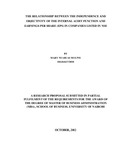| dc.contributor.author | Mugwe, Mary N | |
| dc.date.accessioned | 2013-02-22T11:53:07Z | |
| dc.date.issued | 2012-10 | |
| dc.identifier.citation | MBA Thesis | en |
| dc.identifier.uri | http://erepository.uonbi.ac.ke:8080/xmlui/handle/123456789/10762 | |
| dc.description | The relationship between the independence and objectivity of the internal audit function and earnings per share (EPS) in companies listed in NSE | en |
| dc.description.abstract | The major aim of this study was to find out the relationship between the independence
and objectivity of internal audit function and EPS (profitability) in companies listed in
the NSE. Objectivity, denoting having an impartial, unbiased attitude, is integral to the
internal audit profession. While the increasing involvement of internal auditors in
enterprise risk management (ERM) poses a threat to their professional objectivity, the
expanding oversight responsibilities of audit committees may act to mitigate any such
effect. This study presents empirical evidence on the effects of the extent of internal
auditors’ involvement in ERM and their relationship with the audit committee and the
management , on the loss of internal auditors’ perceived objectivity and their effect on
profitability.
This study draws on agency and institutional theory to examine the issue of internal
audit’s independence through its relationship with components of corporate governance.
The internal audit function is actively considered as one of the four components of
corporate governance, along with the board, management and external auditors. It serves
this purpose by providing a range of services in its capacity of monitoring and consulting
which is actively sought by the other components of corporate governance to satisfy their
extended accountability requirements. The integrity of these services is, however, only
assured if internal audit maintains its independent status. As such there is a “tension”
resulting from the pressure to provide these value added services as perceived by the
parties involved and maintaining its independence status.
Based on an extended study of organizations listed in the NSE, this study critically
examines the results of the study against existing literature and best practice guidelines to
determine if internal audit functions operating under this tense environment are operating
independently.
Data from the field was analyzed using frequencies and percentages. The data was also
edited, coded and well arranged in order to ensure accuracy and completeness. According
to the research findings, internal auditors contribute to profitability of firms mainly
through detection of fraud and advising management on internal control system.
The findings indicated that the major constraints to internal audit effectiveness were lack
of independence in some aspects. It was also established that there is a positive
relationship between independence of internal audit and profitability of firms. This meant
that if organizations provide a conducive working environment to the internal auditor,
then they will be profitable thus having a positive EPS. | en |
| dc.description.sponsorship | University of Nairobi | en |
| dc.language.iso | en | en |
| dc.subject | Independence & objectivity | en |
| dc.subject | Nairobi Securities Exchange | en |
| dc.subject | Earnings per share (EPS) | en |
| dc.subject | Internal audit function | en |
| dc.title | The relationship between the independence and objectivity of the internal audit function and earnings per share (EPS) in companies listed in NSE | en |
| dc.type | Thesis | en |
| local.publisher | School of Business, University of Nairobi | en |

